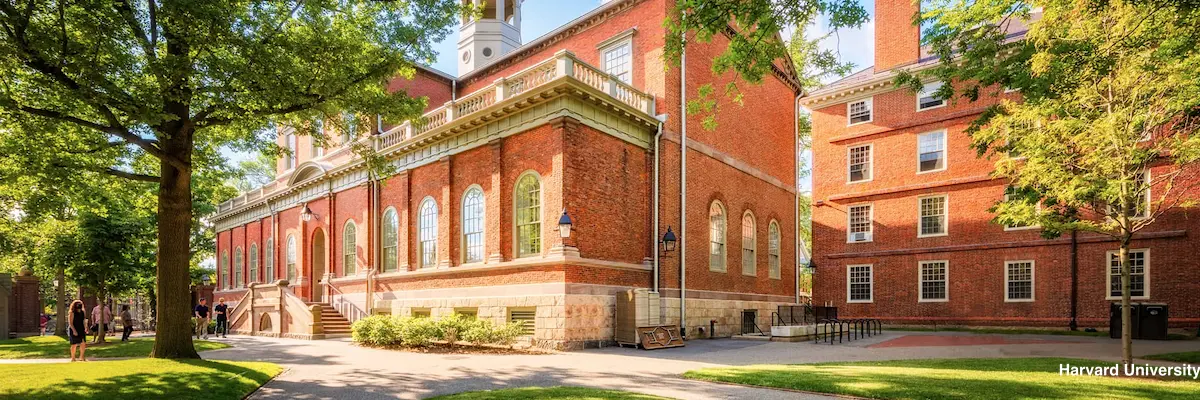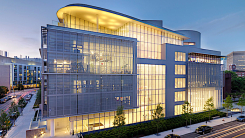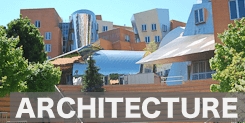Harvard University is probably the most acclaimed Ivy League university in the country. Established in 1636, it is the oldest institution of higher learning. Eight U.S. presidents have been graduates, and 144 Nobel Laureates have been students, faculty, or staff affiliates. Harvard's endowment of some $36 billion is the largest of any university in the world.
Harvard University is organized into 11 schools, including the Arts and Sciences, Business, Law, and Medical schools. The school offers comprehensive bachelor's, master's, and doctoral programs, as well as post-grad certificates. It also provides continuing education programs through the Harvard Extension School.
The four-year, full-time undergraduate program emphasizes instruction with an "arts and sciences focus." Undergraduate students are required to complete courses in eight general education categories: aesthetic and interpretive understanding, culture and belief, empirical and mathematical reasoning, ethical reasoning, science of living systems, science of the physical universe, societies of the world, and the United States in the world.
One of the foundations of the undergraduate experience at Harvard is the house system. Ninety-seven percent of all undergraduates live in one of the 12 residential houses. A 13th House, Dudley House, serves non-residents and includes graduate student members. Each house accommodates 350–500 students with its own dining hall, common rooms, and facilities for academic, recreational, and cultural activities. The Houses maintain robust cultural and social opportunities. Houses are home to their own film, music, art, and drama that range from small-scale jam sessions to a full opera. In addition, houses also field a variety of sports teams that compete in an intramural program. A variety of social functions, such as Masters’ Open Houses, formal dances, and coffee hours, provide students with an opportunity to relax and interact with members of their house community.
Harvard’s athletic teams compete in the Ivy League, and every football season ends with "The Game," an annual match-up between storied rivals Harvard and Yale. The school offers twenty different sports for both men and women, including baseball, basketball, football, ice hockey, field hockey, tennis, skiing, and more.
Harvard's 210-acre main campus is centered on Harvard Yard in Cambridge and extends into the surrounding Harvard Square neighborhood. The Harvard MBTA station provides public transportation via bus service and the Red Line subway. The school is steps away from Harvard Square, with many options in entertainment, shopping, and cultural venues.
Contents
Benefits of a Harvard Education>
Benefits of a Harvard Education
A Harvard education offers numerous benefits, starting with access to world-class faculty, cutting-edge research opportunities, and a rigorous academic environment that challenges students to think critically and creatively. The university provides a wide array of resources—from libraries and labs to mentorship and interdisciplinary programs—designed to help students explore their interests and develop a deep understanding of their chosen fields. The diverse student body also fosters global perspectives and encourages meaningful dialogue across cultures and disciplines.
Beyond academics, Harvard’s name carries significant prestige, opening doors to competitive job markets, top graduate programs, and influential networks. Alumni gain lifelong access to the Harvard community, which includes leaders in business, politics, science, and the arts. This powerful network can provide mentorship, career opportunities, and support long after graduation. A Harvard education not only equips students with knowledge and skills but also instills confidence, resilience, and a commitment to making a positive impact on the world.
Academics
Harvard University is world-renowned for its academic excellence, intellectual rigor, and global impact. It offers over 3,700 courses across 50 undergraduate concentrations and 370 graduate programs through 12 degree-granting schools, including Harvard College, Harvard Business School, Harvard Law School, and Harvard Medical School. The university’s flexible liberal arts curriculum encourages exploration across disciplines, combining foundational knowledge with opportunities for research, internships, and global study.
Harvard holds an R1 research designation and invests over $1.2 billion annually in research, supporting innovation through institutes like the Wyss Institute for Biologically Inspired Engineering and the Harvard Kennedy School’s Belfer Center. Students benefit from a 7:1 student-to-faculty ratio, with professors who are leaders in fields such as economics, computer science, public health, and political science.
Undergraduates learn through small seminars, hands-on labs, and interdisciplinary projects that connect theory to practice. Graduate and professional programs—such as the MBA, JD, MD, and PhD—emphasize real-world application through case studies, clinical work, and collaborative research.
Students praise Harvard’s vast academic resources and freedom to customize their learning paths, though many note that the environment is demanding and self-directed. Overall, Harvard’s blend of tradition, innovation, and global perspective makes it one of the most influential academic institutions in the world.
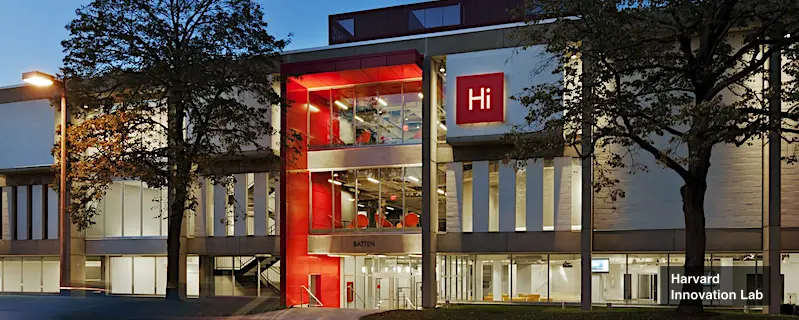
Career Outcomes
Harvard University graduates enjoy exceptional career outcomes across nearly every field. About 96% of undergraduates from the Class of 2023 were employed, in graduate school, or pursuing fellowships within six months of graduation. Top destinations include finance (e.g., Goldman Sachs, J.P. Morgan), consulting (e.g., McKinsey, Bain, BCG), technology (e.g., Google, Microsoft, Amazon), and public service roles in government and nonprofits.
Graduates of Harvard Business School report particularly strong results, with about 90% of MBA students receiving job offers within three months and a median base salary of around $175,000 (2024). Law, medical, and policy school graduates also maintain high placement and earnings rates, often securing positions in prestigious firms, hospitals, and international organizations.
The Harvard Career Office provides comprehensive support, including career advising, job fairs, alumni mentorship, and internship opportunities worldwide. Harvard’s powerful global alumni network of over 370,000 members further enhances career connections and access to top employers.
While the Harvard name opens doors across industries and countries, students emphasize that success also depends on proactive networking and taking advantage of the university’s vast professional and research resources.
How to get into Harvard
Getting into Harvard requires more than just top grades and test scores—it demands a combination of academic excellence, intellectual curiosity, and personal distinction. Most successful applicants are at the top of their class and have taken the most challenging courses available to them. While standardized test scores such as the SAT or ACT are optional, high scores can still strengthen an application. Harvard also values demonstrated passion for learning, original thinking, and a willingness to push beyond the classroom through research, competitions, or independent projects.
Equally important are the personal qualities and life experiences that applicants bring. Harvard seeks students who are not only high achievers but also leaders, innovators, and individuals with a strong sense of purpose. Meaningful extracurricular involvement, community service, and a commitment to making a difference can help an applicant stand out. Personal essays and recommendation letters provide insight into an applicant's character, values, and potential to contribute to the Harvard community. Authenticity, clarity of purpose, and a unique voice often make the strongest impression.
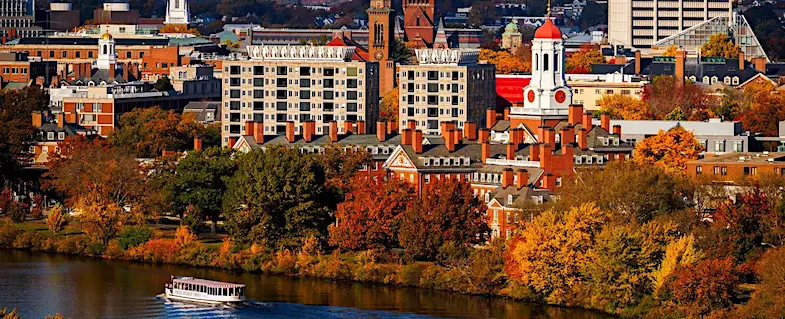
Campus
Harvard University’s campus in Cambridge, Massachusetts, spans 209 acres along the Charles River and blends historic architecture with cutting-edge facilities, creating an inspiring environment for its ~25,000 students. Centered around the iconic Harvard Yard, the campus features landmarks like Widener Library and Memorial Hall alongside modern hubs such as the Smith Campus Center and Science and Engineering Complex. Students enjoy access to world-class libraries, museums, and athletic facilities, with Harvard Square’s lively shops and cafés just steps away. The campus offers a unique mix of tradition and innovation, fostering both academic focus and vibrant student life within easy reach of Boston’s cultural and professional opportunities.
Student Life
Harvard University offers a vibrant and intellectually stimulating student life, combining academic rigor with rich social, cultural, and extracurricular opportunities. At the heart of campus, Harvard Yard and the residential House system foster close-knit communities, with 97% of undergraduates living on campus in suites featuring dining halls, common rooms, and events like formal dances, open houses, and intramural sports.
Students participate in over 450 clubs and organizations, ranging from the Harvard Crimson newspaper and debate society to cultural groups (e.g., South Asian Association) and professional societies (e.g., Harvard College Consulting Group). Athletics thrive with 42 NCAA Division I teams (Ivy League), excelling in rowing, hockey, and squash, alongside club sports and iconic events such as the annual Harvard-Yale football game. Cultural offerings include performances at the American Repertory Theater, exhibitions at Harvard Art Museums, and events like International Education Week.
The campus’s location near Harvard Square provides access to cafes, and the MBTA Red Line, connecting students to Boston’s cultural, tech, and finance hubs for internships and networking. Overall, Harvard student life nurtures leadership, friendships, and lifelong connections in a dynamic, tradition-rich environment
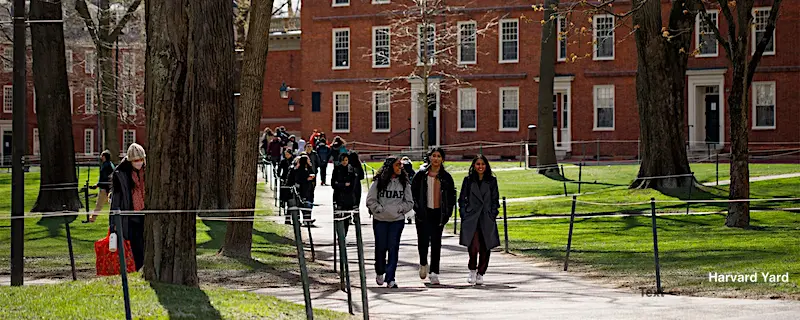
Visiting Harvard University
To visit Harvard, start by heading to Harvard Yard in Cambridge, Massachusetts, the historic heart of the university. The campus is easily accessible by public transportation, especially via the Red Line on the MBTA, with the Harvard Square station just steps away. Once there, you can take a self-guided walk or join an official campus tour offered through the Harvard Visitor Center, which provides insight into the university’s history, architecture, and student life. Be sure to check Harvard’s website for tour schedules, visitor guidelines, and any required registrations. A visit is a great way to get a feel for the academic atmosphere and vibrant campus culture. More Details...
Popular Undergrad Programs at Harvard
Harvard undergraduates can choose from 50 concentrations within the College, allowing flexibility and interdisciplinary study. Some of the most popular and highly pursued majors include:
-
Economics – Known for rigorous quantitative training and strong career outcomes in finance, consulting, and policy.
-
Computer Science – Offers expertise in programming, data science, AI, and computational research.
-
Government/Political Science – Prepares students for careers in public service, law, and international relations.
-
Psychology – Focuses on behavioral science, neuroscience, and mental health research.
-
Biology and Life Sciences – Popular among students pursuing medicine, research, or biotechnology careers.
-
Engineering Sciences – Includes bioengineering, electrical, and mechanical tracks.
-
History – Offers broad analytical and research skills valued in law, education, and journalism.
-
Applied Mathematics/Statistics – Strong for students aiming for finance, data science, and analytics careers.
Many undergraduates also pursue interdisciplinary concentrations or dual majors, combining fields like Economics and Computer Science or Government and Philosophy, reflecting Harvard’s emphasis on flexible, integrative learning.
![]()
Popular Graduate Programs at Harvard
Harvard University offers an extensive array of graduate and professional programs across its 12 degree-granting schools, enrolling over 18,000 graduate and professional students. Known for its global reputation, selectivity, and academic excellence, Harvard’s graduate programs combine rigorous scholarship, interdisciplinary collaboration, and hands-on learning that connects theory with real-world application. Students benefit from access to world-class faculty, $1.2 billion in annual research funding, and strong industry ties across Boston and beyond.
Some of Harvard’s most popular and prestigious graduate programs include:
-
Harvard Business School: Offers the MBA, Executive MBA, and doctoral programs, with concentrations in finance, entrepreneurship, marketing, and leadership. HBS emphasizes case-based learning, global immersion programs, and access to top employers like McKinsey, Goldman Sachs, and Google.
-
Harvard Law School: Provides the JD, LLM, and SJD degrees, renowned for excellence in corporate law, constitutional law, and international human rights. Students engage in clinics, moot courts, and research centers such as the Berkman Klein Center for Internet & Society.
-
Harvard Medical School: Offers MD, PhD, and joint MD/PhD programs, combining cutting-edge biomedical research with clinical training through affiliates like Massachusetts General Hospital and Brigham and Women’s Hospital.
-
Graduate School of Arts and Sciences : Home to master’s and doctoral programs in Economics, Computer Science, Political Science, History, and Psychology, GSAS drives much of Harvard’s fundamental research across sciences, humanities, and social sciences.
-
Harvard Kennedy School : Offers the Master in Public Policy (MPP), Master in Public Administration (MPA), and doctoral degrees, training future leaders in government, international relations, and nonprofit management.
-
Harvard Graduate School of Education: Provides EdM, EdLD, and doctoral programs focused on educational leadership, innovation, and policy reform, with an emphasis on social impact.
-
Other notable schools include the Harvard T.H. Chan School of Public Health (MPH, DrPH, ScD programs in global health and epidemiology), Harvard Graduate School of Design (GSD) (architecture, urban planning, and landscape architecture), and the Harvard Divinity School (MTS, MDiv, ThD programs in religion and ethics).
Across all programs, students engage in research, case studies, internships, and global fieldwork, leveraging Harvard’s R1 research infrastructure, cross-school collaboration, and Cambridge-Boston location near leading hospitals, tech startups, and policy institutions. Graduates leave prepared for high-level roles in academia, business, government, and international organizations, joining a network of over 370,000 alumni worldwide
International Students at Harvard University
Harvard hosts a vibrant international community, with around 7,000 students from 140+ countries, making up roughly 25% of its ~25,266 students (Fall 2024). Major countries of origin include China, India, Canada, South Korea, and the UK. The university fosters a global campus culture through diverse events, organizations, and programs that celebrate cross-cultural exchange.
Admissions
International applicants apply via the Common Application, Coalition Application, or QuestBridge, submitting transcripts, proof of English proficiency (TOEFL iBT 100+, IELTS 7.0, or Duolingo 120+ for non-native speakers), and a passport copy. SAT/ACT scores are optional through Fall 2026, and interviews via InitialView, Vericant, or alumni are recommended. Competitive applicants typically have a GPA of ~4.0 (average admitted: ~3.9). The international undergraduate acceptance rate is ~3.6%, making early application advisable (Early Action: Nov 1, 2025; Regular Decision: Jan 1, 2026).
Support Services
The Harvard International Office provides visa and immigration advising, orientation, and cultural programming like the International Student Reception. The Center for English Language and Academic Preparation offers tailored courses for language and cultural adjustment. Students also access academic advising, wellness support via CAMHS, and student groups such as the South Asian Association and Harvard African Students Association.
Scholarships and Financial Aid
Harvard meets 100% of demonstrated financial need for all students through grants (no loans), with ~55% of undergraduates receiving aid averaging ~$67,000/year. Aid is not need-blind for international students. Merit awards include the Faculty Scholarship (~$10,000–$20,000/year) and the Harvard Financial Aid Initiative (HFAI), which covers full costs for families earning up to $85,000. Graduate programs offer fellowships or assistantships (e.g., HBS, GSAS PhDs). Proof of funds is required for visa processing.

